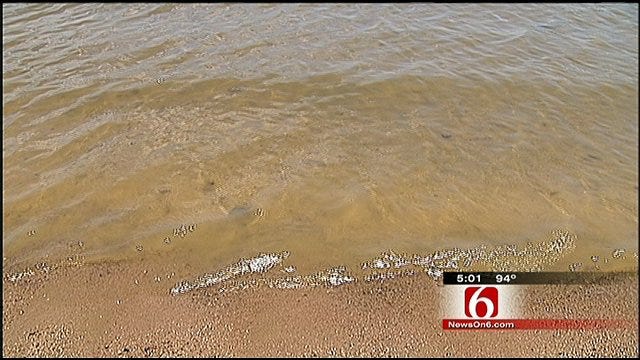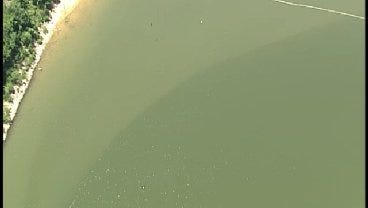Blue Green Algae Bloom Closes Beach At Ft. Gibson Lake
The Army of Corps of Engineers has closed Taylor's Ferry Swim Beach at Ft. Gibson Lake because of a blue-green algae bloom discovered there. <br /><br /><a href="http://www.newson6.com/story/15041595/corps-of-engineers-testing-more-lakes-for-blue-green-algae" target="_blank">Grand Lake Waters Improved But Not Safe For Swimming</a>Friday, July 8th 2011, 12:41 pm
NewsOn6.com & Laura Moss, News On 6
FT. GIBSON, Oklahoma -- Another Oklahoma lake is stricken with a poisonous algae. The Army of Corps of Engineers has closed Taylor's Ferry Swim Beach at Ft. Gibson Lake because of a blue green algae bloom discovered there.
The Corps closed the beach until further notice as a precaution Friday.
"We do get quite a few people come out here and just enjoy the beach because it's one of our biggest ones that we have," Josh Mathis, a Park Ranger at Fort Gibson, said.
Park Rangers put up signs and locks to keep people out of the water. Official signage went up Friday afternoon warning swimmers that these parts aren't safe for diving in.
"We had at Grand Lake, but we didn't know about it here, so we just came to go swimming at this beach and it was closed," Abbie Tiffany said.
Lake officials say they've had more phone calls asking about the lake and reporting sightings. Testers found an Algae bloom at Chouteau Bend as well, but say it's a non harmful green algae.
"After the exposure at Grand Lake people are really looking out for it," Mathis said.
Park Rangers said the water at Fort Gibson is a little more green than usual. But, it's a discoloration you wouldn't recognize unless you were a frequent visitor.
"I mean I never heard of it till this summer and, I don't know, it ruins the fun," Tiffany said.
Heat and dry weather are contributors to the high levels of the blue green bacteria. And it doesn't look like either will give any time soon.
"It's in the lake at all times its just most of the times the conditions, it keeps it in check," Mathis said.
With blue green algae in the water at all times, trouble typically comes when it reaches higher levels, like right now. Rangers predict this spike could last as long as a month.
The agency has also gotten reports of algae blooms in Lake Tenkiller from a park visitor and a park volunteer.
This comes just weeks after a blue-green algae outbreak closed off parts of Grand Lake, which is seeing a decrease in its algae levels.
07/07/2011 Related Story: GRDA: Grand Lake Waters Improved But Not Safe For Swimming
Meanwhile, the Army Corps of Engineers continues to monitor all of their lakes for the algae bloom.
As a reminder, blue green algae in mild cases can cause respiratory and stomach issues, even rashes. In more severe instances, people have seen nervous system and even kidney damage.
Young ones, elderly and pets are at the highest risk.
More Like This
July 8th, 2011
September 29th, 2024
September 17th, 2024
Top Headlines
December 14th, 2024
December 14th, 2024
December 14th, 2024
December 14th, 2024














